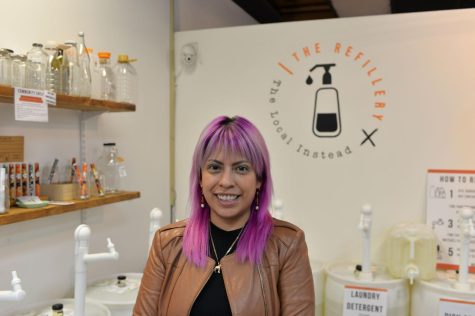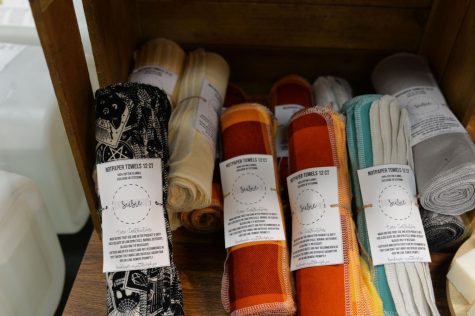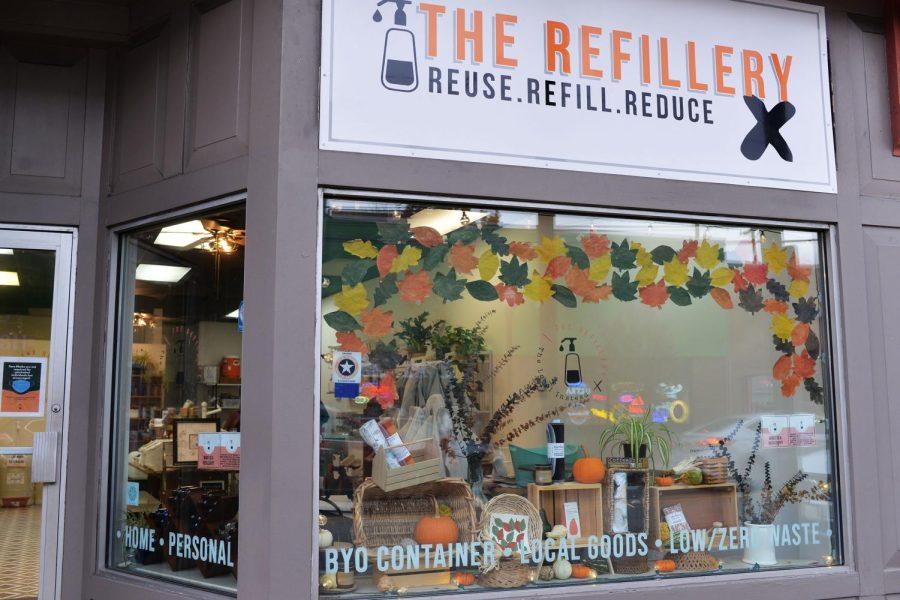Pittburgh’s new Refillery aims to limit single-use plastic, promote zero-waste
Aaiush Jain | Staff Photographer
The Refillery in Squirrel Hill on Murray Avenue.
October 28, 2022
The Refillery is making a low-waste and sustainable lifestyle more accessible to Pittsburgh. The owner, Larissa Russo, opened the zero-waste store in Squirrel Hill a little less than a year ago, after seeing a need in the Pittsburgh community for an alternative to single-use plastic. She said she wanted to create a solution that would support local businesses and is accessible to consumers.
“It came down to the fact that Pittsburgh didn’t have any dedicated stores like this yet,” Russo said.
At The Refillery, customers bring or buy empty containers to reuse and refill them with personal and home products such as soaps, skincare, cleaning products and kitchen supplies. Customers fill containers as desired and pay by weight.
Russo said she first tested the idea of refillable products by applying to The Neighborhood Flea, a pop-up market in the Strip District, and the public loved the concept.
“Pittsburgh really, really showed up and loved it,” Russo said.
When creating the company, Russo said her main priority was making products accessible, as well as building a space where the community could come together to make a change. Russo said she envisions using the store for events and pop-ups such as a women in business breakfast series and various workshops and lectures.
“We really want to use our space, not just as a store, but a place to come together around the idea of living a zero-waste lifestyle,” Russo said.
Russo takes great care when sourcing products. She said the store only carries ethically made products, meaning the workers get paid a livable wage and work in safe conditions, and the products are made sustainably in a way that doesn’t harm the environment.
“The three pillars that really drive our decisions are everything being ethical, sustainable and local,” Russo said.
Meeting this standard can sometimes make it harder to source specific products. Russo said it’s sometimes a challenge to find a product that is manufactured locally and ethically but still has a price point that is accessible.
“We’ve had to delay getting some items, for example metal straws,” Russo said. “For them to meet the standards for me to carry, I haven’t been able to find that yet.”

Russo partners with many small businesses in the Pittsburgh area for sourcing. Chez Lapin in Lawrenceville supplies The Refillery with refillable candles. The owner of the candle company, Claire Landuyt, began making candles and skincare 10 years ago and created Chez Lapin five years ago. Landuyt said the partnership is a big success.
“We’ve been doing her refillable candles, of course, which works with her refillable vibe and business as well as my eco-friendly business,” Landuyt said.
A big priority for Landuyt is to make Chez Lapin as sustainable as possible. The brand does not package their products in an effort to reduce waste.
“I think candle packaging is incredibly wasteful,” Landuyt said.
Chez Lapin’s products sold in retail are in recycled, letterpressed dust covers that are locally sourced and recyclable. To reduce carbon emissions, Landuyt sources her ingredients and materials locally or from neighboring states.
“I take great pride in only sourcing ingredients that are sustainably harvested or produced or manufactured,” Landuyt said. “A lot of our botanicals we are planting, drying and harvesting ourselves for our products.”
Landuyt said she gets a lot of inspiration for products from her time spent in France. Landuyt embodies certain French landscapes, meals or drinks through her products as well as the slow French lifestyle and indulgence in simple pleasures like coffee.

“I spent a lot of time in France, and I’ve always loved France,” Landuyt said. “I’ve always wanted a piece of that here at home with me in the States.”
Chez Lapin and The Refillery have partnered for two candle refill events, with another one planned for December. Landuyt comes into The Refillery and refills customer’s candles right on the spot. Customers vote on which four fragrances they want to see at the refilling events, and then bring in their empty candle jars to get refilled with their desired amount and fragrance of candle wax.
“This past time we filled almost 100 candles,” Landuyt said. “That’s 100 candle jars that we’ve put in people’s homes that weren’t produced or wasted.”
Keeping a consistent focus on local business, Russo said she’s interested in a business-to-business model, so The Refillery recently launched a platform for businesses to buy products in bulk. The process began this month, and Goodlander Cocktail Brewery was the first company to order.
“We are still very much getting started with it,” Russo said. “But I can definitely see the desire for it.”
The owner of the brewery, Wes Shonk, opened Goodlander Cocktail Brewery in the Larimer neighborhood, adjacent to Bakery Square, but the company also does events around the city.
“We say a cocktail brewery is very similar to a traditional brewery,” Shonk said. “We just make kegs of cocktails instead of beer.”
Shonk said he created the cocktail brewery with a business model surrounding low-waste beverages.
“We use real, fresh ingredients,” Shonk said. “All our spent produce is composted.”
In addition to using low-waste ingredients, Goodlander Cocktail Brewery also specializes in reusable and refillable containers. The drinks come in kegs that customers wash and refill.
In an effort to reduce even more single-use plastic, Shonk said Goodlander Cocktail Brewery buys refillable hand soap and vinegar from The Refillery. Shonk recognized that these are frequently used products, and continually purchasing gallons of hand soap or vinegar accumulates a lot of plastic.
“We all need to use soap, and it’s frustrating when every soap available is packaged in single-use packaging,” Shonk said.
Shonk said The Refillery specializes in hard-to-find products, like white vinegar, and switching to refillable products is beneficial in producing less waste which is a big goal for his company.
“I know the concept is popular in other larger cities, and I’m very delighted that Pittsburgh has a refillery,” Shonk said.
He has seen the positive effects of switching to refillable products, and recommends other companies do the same.
“I think the quality is just as good, and the price is basically the same and you don’t have a piece of waste at the end of it,” Shonk said. “I recommend that all companies switch to refillable products in any category where it’s possible.”








